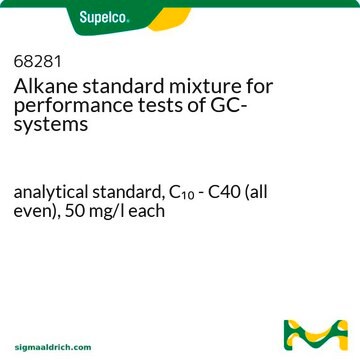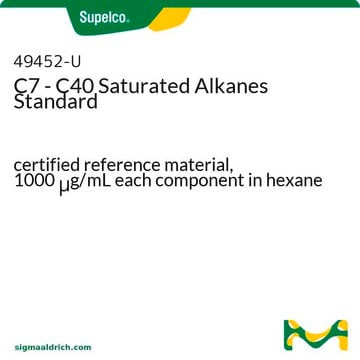71631
Sodium bicarbonate
tested according to Ph. Eur.
Synonym(s):
Natrii hydrogenocarbonas, Sodium hydrogen carbonate
Sign Into View Organizational & Contract Pricing
All Photos(3)
About This Item
Linear Formula:
NaHCO3
CAS Number:
Molecular Weight:
84.01
Beilstein:
4153970
EC Number:
MDL number:
UNSPSC Code:
12352300
PubChem Substance ID:
NACRES:
NA.21
Recommended Products
Agency
USP/NF
tested according to Ph. Eur.
Quality Level
Assay
99.0-101.0%
form
solid
pKa (25 °C)
(1) 6.37, (2) 10.25 (carbonic acid)
solubility
water: soluble 50 g/L
density
2.16 g/mL at 25 °C (lit.)
SMILES string
[Na+].OC([O-])=O
InChI
1S/CH2O3.Na/c2-1(3)4;/h(H2,2,3,4);/q;+1/p-1
InChI key
UIIMBOGNXHQVGW-UHFFFAOYSA-M
Looking for similar products? Visit Product Comparison Guide
Related Categories
Application
- Lyophilized rumen fluid as a ruminal fermentation modifier in high grain-fed acidotic goats.: This research examines the effects of sodium bicarbonate on the rumen fluid of goats, particularly in acidosis prevention under high grain diets. It underscores its importance in veterinary science and animal nutrition, providing a preventive measure against digestive disorders in livestock (A Ruba Nanthini et al., 2024).
- Response of photosynthetic characteristics and antioxidant system in the leaves of safflower to NaCl and NaHCO(3).: This paper focuses on the biochemical responses of safflower leaves to sodium bicarbonate and sodium chloride treatments. The findings highlight how sodium bicarbonate can mitigate salt stress effects, enhancing understanding of plant physiology under stress conditions (Song L et al., 2024).
- Atomic force microscopy in mechanical measurements of single nanowires.: In this study, sodium bicarbonate is used in preparing samples for atomic force microscopy, demonstrating its utility in high-precision scientific measurements. The research enhances our understanding of material properties at the nanoscale, crucial for developing nanotechnology applications (Pruchnik BC et al., 2024).
Biochem/physiol Actions
Sodium bicarbonate can be used to treat salicylate poisoning.
Storage Class Code
13 - Non Combustible Solids
WGK
WGK 1
Flash Point(F)
Not applicable
Flash Point(C)
Not applicable
Personal Protective Equipment
dust mask type N95 (US), Eyeshields, Gloves
Choose from one of the most recent versions:
Already Own This Product?
Find documentation for the products that you have recently purchased in the Document Library.
Customers Also Viewed
Salicylate toxicity from genital exposure to a methylsalicylate-containing rubefacient
Thompson TM, et al.
The Western Journal of Medicine, 17(2), 181-181 (2016)
Sophia Zoungas et al.
Annals of internal medicine, 151(9), 631-638 (2009-11-04)
Intravenous sodium bicarbonate has been proposed to reduce the risk for contrast-induced nephropathy (CIN). To determine the effect of sodium bicarbonate on the risk for CIN. MEDLINE, PubMed, EMBASE, and the Cochrane Central Register of Controlled Trials from 1950 to
Eric A J Hoste et al.
Nephrology, dialysis, transplantation : official publication of the European Dialysis and Transplant Association - European Renal Association, 25(3), 747-758 (2009-08-26)
There have been conflicting reports on the use of intravenous administration of sodium bicarbonate for prevention of contrast-induced acute kidney injury (CI-AKI). The aim of this study was to evaluate the use of sodium bicarbonate for prevention of CI-AKI. This
Michael Haase et al.
PLoS medicine, 10(4), e1001426-e1001426 (2013-04-24)
Preliminary evidence suggests a nephroprotective effect of urinary alkalinization in patients at risk of acute kidney injury. In this study, we tested whether prophylactic bicarbonate-based infusion reduces the incidence of acute kidney injury and tubular damage in patients undergoing open
Shay P McGuinness et al.
Critical care medicine, 41(7), 1599-1607 (2013-05-21)
Cardiac surgery-associated acute kidney injury occurs in up to 50% of patients and is associated with increased mortality and morbidity. This study aimed to discover if perioperative urinary alkalinization with sodium bicarbonate infusion reduces the prevalence of cardiac surgery-associated acute
Our team of scientists has experience in all areas of research including Life Science, Material Science, Chemical Synthesis, Chromatography, Analytical and many others.
Contact Technical Service





